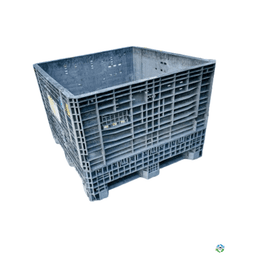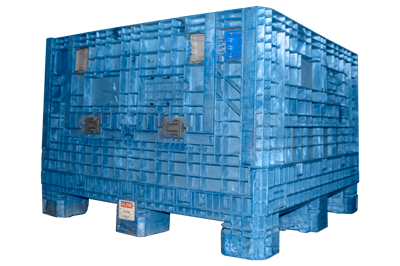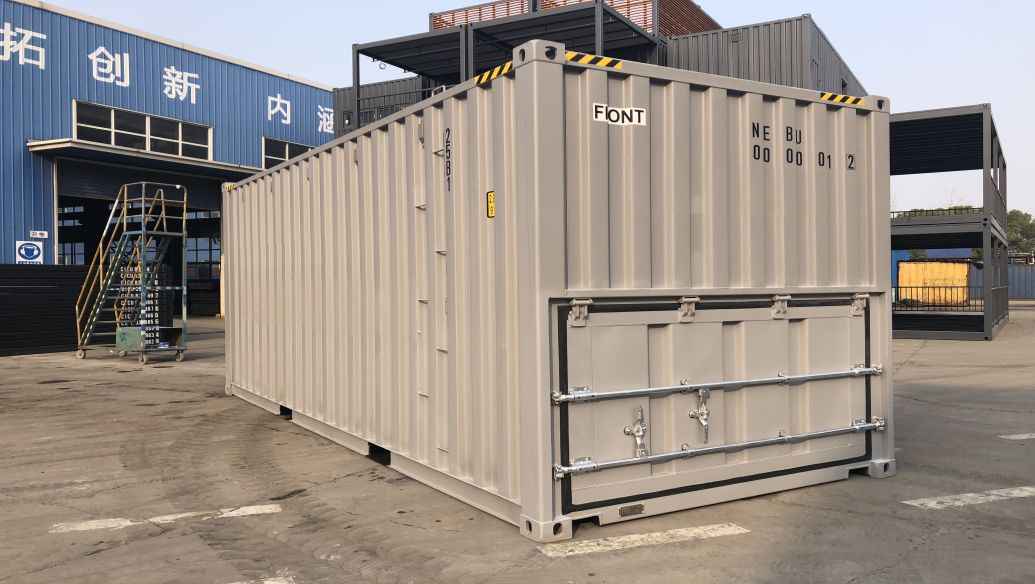Discover how industries save costs with refurbished bulk containers for everyday use
Wiki Article
Why Bulk Containers Are Vital for Affordable and sustainable Transport
Bulk containers play a necessary function in modern-day logistics. They facilitate the reliable movement of huge quantities of goods, consequently maximizing transportation procedures. This approach not only minimizes costs however also lessens environmental impact through reduced emissions and waste generation. As sectors look for more sustainable methods, the fostering of bulk containers is coming to be progressively substantial. What ramifications does this change hold for future logistics and supply chain management?
The Benefits of Utilizing Bulk Containers in Logistics
Bulk containers transform logistics by boosting effectiveness and sustainability. These containers permit the transportation of large amounts of items in a solitary trip, markedly reducing the number of trips needed. This not only streamlines operations yet additionally reduces labor expenses linked with handling, loading, and unloading. On top of that, bulk containers are made to maximize room usage within transportation automobiles, guaranteeing that more products can be shipped at the same time.The standardization of mass containers likewise streamlines the logistics process. With consistent measurements, they can be quickly piled and kept, causing improved stockroom administration. Bulk containers typically feature sturdy materials that safeguard contents from damage during transportation, thus decreasing product loss and enhancing general reliability. As a result, organizations can experience enhanced supply chain efficiency, ultimately resulting in boosted productivity and client fulfillment. This combination of variables makes bulk containers a vital asset in contemporary logistics.
Environmental Effect: Reducing Waste and Carbon Footprint
As sectors progressively prioritize sustainability, the adoption of mass containers has arised as a key strategy for decreasing waste and decreasing carbon impacts. These containers decrease making use of product packaging products, such as boxes and plastic, thus notably decreasing total waste generation. By consolidating deliveries, bulk containers boost transport performance, permitting for more items to be transported per journey. This decrease in journeys straight correlates with lower greenhouse gas emissions, adding to a smaller sized carbon footprint.Bulk containers can frequently be reused or recycled, further alleviating ecological effect. The sturdiness of these containers warranties they can endure numerous transportation cycles, lowering the requirement for single-use choices. used bulk containers. By enhancing logistics and promoting reliable resource use, mass containers not just sustain lasting techniques but additionally motivate markets to align with worldwide environmental objectives. Inevitably, their application reflects a dedication to eco-friendly stewardship and accountable source management
Cost Cost Savings: Exactly How Bulk Containers Lower Transportation Expenditures
While numerous firms look for methods to improve their profits, the usage of bulk containers provides a substantial opportunity for lowering transport expenses. Mass containers maximize the quantity of goods carried, permitting businesses to deliver larger amounts at as soon as. This efficiency lowers the number of trips required, straight lowering gas costs and minimizing labor expenses connected with loading and discharging.Furthermore, mass containers usually include streamlined layouts that optimize space use within transport vehicles. This indicates less vacant areas, causing much more efficient use available ability. Furthermore, the resilience of bulk containers can lower the danger of item damage throughout transportation, ensuring and lowering losses that more items arrive undamaged.
Enhancing Supply Chain Effectiveness With Mass Storage Solutions
Bulk storage solutions play a crucial duty in boosting supply chain effectiveness by optimizing stock administration. By combining items into fewer, bigger containers, businesses can significantly decrease handling prices connected with constant transfers and processing. This streamlined approach permits better tracking and management of inventory, inevitably resulting in enhanced operational efficiency.Streamlined Inventory Administration
Efficient inventory management is essential for optimizing supply chain operations, particularly when organizations adopt bulk storage space options. These solutions make it possible for organizations to keep higher supply levels while minimizing the regularity of replenishment. By settling materials into bulk containers, firms can enhance their stock processes, minimizing the intricacy connected with tracking several smaller sized packages. This strategy helps with exact stock counts and improves projecting accuracy, enabling even more enlightened decision-making. Additionally, mass storage remedies streamline warehouse company, making it much easier to situate and access products when needed. Consequently, companies can accomplish a much more reliable inventory turnover price, inevitably boosting general supply chain efficiency and minimizing the likelihood of stockouts or overstock scenarios.
Reduced Handling Prices
The execution of bulk storage space remedies not only simplifies stock monitoring but also substantially decreases dealing with prices throughout the supply chain. By combining materials into mass containers, firms minimize the requirement for regular handling and transfer between different storage and transport devices. This strategy lowers labor costs connected with loading, unloading, and relocating smaller bundles. Additionally, bulk storage minimizes the frequency of shipments, resulting in reduced transportation prices and lowered fuel consumption. Consequently, organizations can maximize their logistics procedures, enabling a more efficient allowance of sources. Inevitably, lowered dealing with expenses add to enhanced overall supply chain effectiveness, promoting a setting that sustains both sustainability and financial practicality.
Convenience of Mass Containers Throughout Numerous Industries
Although several industries have distinctive demands for transport and storage, bulk containers have actually emerged as a versatile option that fulfills a variety of requirements. These containers, ranging from large containers to specialized tanks, can fit varied materials, including liquids, granules, and powders. In the farming industry, mass containers help with the transport of grains and plant foods, while the food and beverage market uses them for components and ended up items. The chemical industry depends on mass containers for securely transporting hazardous materials, guaranteeing conformity with safety laws. Furthermore, building and construction companies gain from bulk containers for transporting accumulations and other products. Their versatility includes different modes of transport, consisting of trains, ships, and vehicles, enhancing logistical performance. This versatility not only improves procedures across various fields but also advertises sustainability by decreasing product packaging waste and enhancing area en route. Bulk containers play an important role in modern supply chain administration.Future Patterns wholesale Container Use and Sustainability
The future of mass container use is progressively formed by ingenious materials growth that boosts sustainability. In addition, automation in logistics assures to improve operations, reducing waste and improving efficiency. Welcoming circular economic climate techniques will additionally reinvent how bulk containers are designed, utilized, and recycled, cultivating a more sustainable transportation landscape.Cutting-edge Materials Development
As industries significantly focus on sustainability, ingenious products advancement in mass containers arises as a significant aspect in enhancing green transport solutions. Researchers and suppliers are checking out naturally degradable plastics, recycled composites, and lightweight metals to minimize environmental influence. These products not just minimize waste however likewise enhance fuel performance by reducing the general weight of containers. Additionally, innovations in wise products, which can adapt to varying conditions, enhance the toughness and functionality of mass containers. The integration of these cutting-edge products straightens with round economic situation principles, advertising reuse and recycling. As the need for lasting methods expands, the development of such products will certainly play a crucial role in shaping the future of bulk container use in logistics and transport.Automation in Logistics
Considerable improvements in automation are positioned to transform logistics and the usage of bulk containers, boosting sustainability in transportation. Automated systems, consisting of drones and independent cars, are enhancing the activity of mass containers, minimizing the dependence on conventional fuel-powered transport. These modern technologies enhance transmitting and packing procedures, boosting and lessening empty miles gas effectiveness. Additionally, automated supply monitoring systems boost tracking and monitoring of bulk containers, guaranteeing better source allowance and lowered waste. The integration of the Web of Points (IoT) allows real-time data evaluation, allowing aggressive decision-making that aligns with sustainability objectives. As automation proceeds to progress, it is expected to drive better developments wholesale container usage, ultimately supporting even more lasting logistics methods and lowering the environmental influence of transport.Circular Economic Situation Practices
Improvements in automation are setting the stage for a much more integrated strategy to circular economic climate practices in the domain of bulk container usage. As industries increasingly accept sustainability, mass containers are being made for longevity and reusability. This change not only reduces waste however likewise boosts resource effectiveness. Companies are adopting techniques such as closed-loop systems, where used containers are collected, reconditioned, and reestablished into the supply chain. In addition, clever technologies track container life cycles, helping with far better monitoring and minimizing ecological effect. The collaboration between producers, logistics service providers, and end-users is necessary in establishing standards for sustainable container use. refurbished bulk containers. Future trends suggest an expanding emphasis on products that are biodegradable and recyclable, additional enhancing the circular economic climate's principles in mass transportation
Frequently Asked Concerns
What Materials Are Mass Containers Normally Made From?
Mass containers are usually created from durable products such as high-density polyethylene, cardboard, steel, and light weight aluminum. These products give flexibility, stamina, and defense, making them appropriate for carrying various products in different sectors successfully.How Do I Choose the Right Size Mass Container?
Selecting the best size bulk container includes examining the volume of materials to be moved, thinking about managing equipment compatibility, and appraising storage area needs. Correct dimension assurances effectiveness in transport and reduces waste during shipment.Are Bulk Containers Reusable or Recyclable?
Bulk containers are frequently multiple-use, made for multiple trips, improving sustainability. Several can also be reused, depending upon the products made use of. Choosing recyclable choices further supports ecological goals and reduces waste in transport techniques.What Safety Regulations Relate To Mass Container Transportation?
Security regulations for mass container transportation include compliance with the Department of Transport guidelines, proper labeling of hazardous products, architectural integrity evaluations, and adherence to weight limitations to guarantee secure handling and avoid mishaps throughout transportation.Just How Can Services Shift to Utilizing Mass Containers Efficiently?
Businesses can transform to bulk containers by assessing present logistics, educating staff on handling, buying appropriate devices, maximizing stock administration, and teaming up with providers to assure compatibility and efficiency throughout the supply chain.
As markets progressively focus on sustainability, the adoption of mass containers has emerged as a key method for decreasing waste and decreasing carbon footprints. By combining products into mass containers, business can improve their supply procedures, lowering the complexity connected with tracking several smaller sized packages. As industries significantly focus on sustainability, cutting-edge products advancement in bulk containers arises as a substantial aspect in improving environment-friendly transport options. Automated systems, consisting of drones and independent automobiles, are enhancing the motion of mass containers, reducing the reliance on traditional used bulk containers fuel-powered transportation. Furthermore, automated supply administration systems enhance monitoring and monitoring of bulk containers, making sure far better source allocation and decreased waste.
Report this wiki page